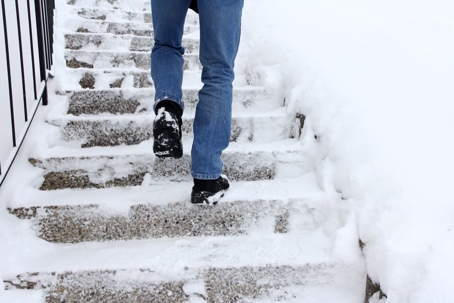Slip and fall accidents are already fairly common in the workplace because they can happen in any type of space and be caused by a variety of factors. A person working out of a cubicle in a typical office, for instance, is just as likely as a construction worker to trip and acquire injuries.
According to the National Safety Council, slip and fall injuries account for 20 percent of all occupational injuries. But the risk of workplace slip and fall accidents increases even more in the winter months, especially if you live in a colder area.
The following areas are prone to snow and ice accumulation can create slippery surfaces and be difficult to avoid:
- Parking lots
- Entryways
- And sidewalks
In 2017 alone, there were over 20,000 reported occupational injuries related to ice, sleet, and snow, according to the U.S. Bureau of Labor Statistics.
Call Powers & Caccavale today or contact our firm online for a free consultation and case review.
Most Common Slip & Fall Injuries
Injuries from slip and falls can range in severity and often include:
- Bone breaks or fractures: Broken bones are some of the most common slip and fall injuries and though they can be minor, they also take time to recover from and may put you out of work for a few weeks.
- Spinal cord and neck injuries: More serious injuries can include spinal cord injuries, which can lead to paralysis. Paralysis may be temporary but it’s typically permanent, and you may not be able to return to work if you can no longer perform responsibilities that require the use of some of your limbs.
- Head trauma and brain injuries: When you fall and hit your head, your injuries can vary from a mild concussion to severe as permanent brain damage that impacts your cognitive functions. Some people with brain injuries may not be able to recall memories, use their limbs, communicate, and more.
Who Is Most Vulnerable?
Anyone can be injured from slip and falls at work, but among those most vulnerable to slip and falls on ice or snow during the wintertime are those who work outdoors.
Some vulnerable workers include those who work in occupations like:
- Truck driving
- Construction
- Maintenance
- Snow cleanup crew
- First responders
- And recreational workers
What To Do After A Workplace Accident
Under Massachusetts personal injury laws, you can’t sue your employer after a slip and fall accident if they have workers’ compensation insurance coverage, but you may be entitled to benefits through the workers’ compensation system, which can cover your medical bills, lost earnings capacity, permanent disability, and some other expenses.
It’s best to report your accident and injuries to your employer as soon as possible. Make sure to document as much of your accident as possible, as many employers and insurance companies deny benefits to workers if they don’t have sufficient evidence to prove their injuries are work-related. If your slip and fall accident on ice or snow took place on company property or while you were driving for work, you could have a valid claim.
Call Us for Compassionate Legal Representation
At Powers & Caccavale, our clients’ well-being is our top priority. With a thorough knowledge of Massachusetts workers’ compensation laws, our workers’ comp attorneys can be trusted to handle your case and go above and beyond to get you the benefits you deserve after an accident.
Navigating the claims process can be complicated when you have to communicate with both your employer and their insurance company – our team can take over communication so you have one less thing to worry about during your recovery process. Allow our team to put our 35+ years of experience to work for you.
After an accident, you deserve to be represented by a firm that is passionate about protecting your workers’ rights. Call Powers & Caccavale for a free consultation today at (617) 379-0016, or contact us online

